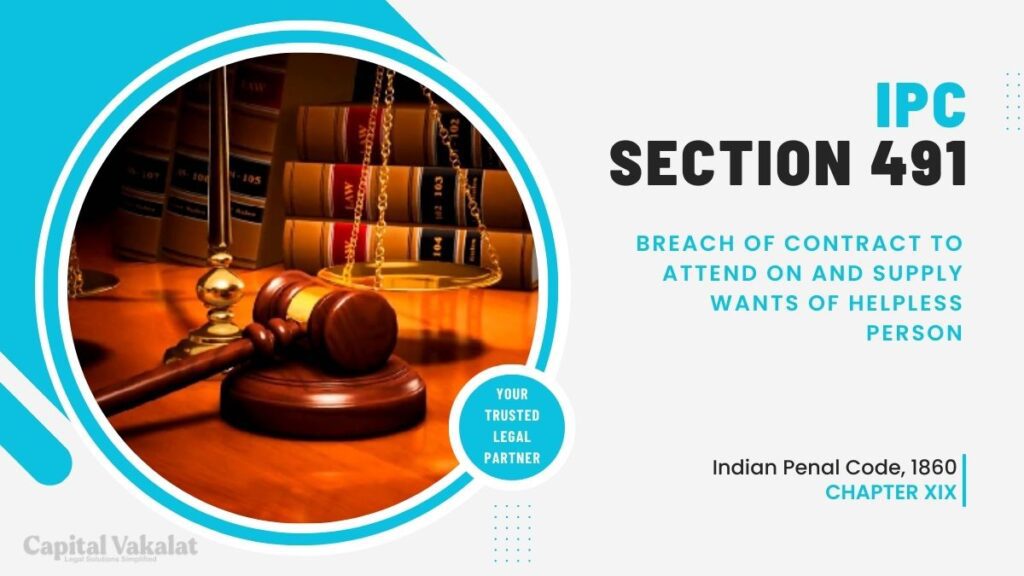In a society bound by legal obligations, Section 491 IPC stands as a crucial provision that addresses the breach of contracts pertaining to attending to and supplying the needs of helpless individuals. Let’s delve into the intricacies of this legal framework, examining its provisions, consequences, and the broader implications on the protection of vulnerable members of society.

Section 491 of the Indian Penal Code (IPC) serves as a guardian of the rights of helpless individuals. The section deals specifically with breaches of contract related to attending to and supplying the wants of those who are unable to care for themselves. This article aims to provide a comprehensive understanding of Section 491 IPC, shedding light on its legal nuances and societal significance.
Understanding Section 491 IPC
At its core, Section 491 IPC outlines the legal consequences of breaching contracts that involve the care and provision of necessities for helpless persons. The legal provisions encompass a range of situations, from personal care to the supply of essential needs. Understanding the intricacies of this section is essential for anyone involved in contracts related to caregiving and support.
Breach of Contract in Attending to Helpless Persons
The scope of attending to helpless persons goes beyond mere physical presence. It extends to the fulfillment of emotional and physical needs, emphasizing the contractual obligations that caregivers and support providers must uphold. A breach in this context not only jeopardizes the legal standing of the involved parties but also raises ethical questions about the treatment of vulnerable individuals.
Supplying Wants of Helpless Persons
The concept of supplying wants, as outlined in Section 491 IPC, delves into the provision of necessities such as food, shelter, and medical care. The article explores various scenarios where breaches may occur, offering insight into the legal ramifications of failing to meet these fundamental needs.
Legal Consequences and Penalties
To deter potential breaches, Section 491 IPC prescribes legal consequences and penalties for those found guilty. This section discusses the severity of these consequences, drawing on real-life cases and legal precedents to illustrate the impact on individuals who neglect their contractual obligations.
Protecting the Rights of Helpless Persons
Safeguarding the rights of helpless persons is a paramount concern addressed by Section 491 IPC. This section of the article delves into the legal measures in place to ensure accountability, emphasizing how the legal system acts as a protector of the vulnerable.
Real-life Cases
Examining real-life cases provides valuable insights into the application of Section 491 IPC. By exploring notable cases, we gain a deeper understanding of the challenges faced by the legal system in enforcing these contractual obligations.
Challenges and Controversies
Despite its noble intentions, Section 491 IPC is not without challenges and controversies. This section of the article critically assesses the limitations of the legal provision, exploring debates on its effectiveness and potential areas for improvement.
Importance of Complying with Section 491 IPC
Compliance with Section 491 IPC is not only a legal necessity but also a moral imperative. This section emphasizes the broader societal impact of adhering to these contractual obligations, highlighting the significance of respectful and compassionate caregiving.
Conclusion
In conclusion, Section 491 IPC plays a pivotal role in upholding the rights and well-being of helpless individuals. This article has provided a comprehensive exploration of the legal framework, from understanding its provisions to examining real-life cases and addressing challenges. It underscores the importance of honoring contractual obligations related to attending to and supplying the wants of helpless persons for a just and compassionate society.
Frequently Asked Questions
What are the typical legal consequences for breaching a contract under Section 491 IPC?
Legal consequences may include fines, imprisonment, or both, depending on the severity of the breach and its impact on the helpless person.
Does Section 491 IPC cover emotional support and companionship as well?
Yes, the section encompasses not only physical care but also emotional support and companionship as integral aspects of attending to helpless persons.
Can a breach of contract under Section 491 IPC be resolved through mediation or alternative dispute resolution methods?
While some cases may be resolved through alternative methods, serious breaches may still warrant legal consequences as prescribed by the section.
How can individuals ensure compliance with Section 491 IPC in caregiving contracts?
It is crucial to clearly outline responsibilities and expectations in contracts, seek legal advice when needed, and uphold the ethical principles of compassionate caregiving to ensure compliance.